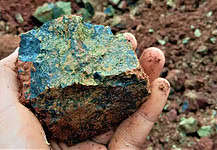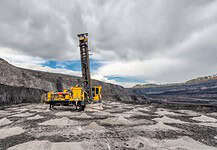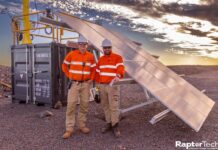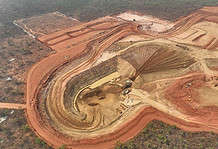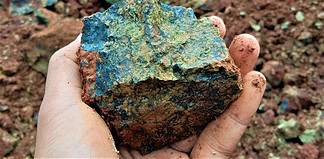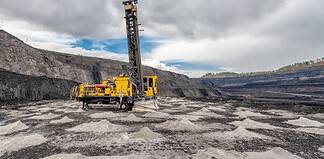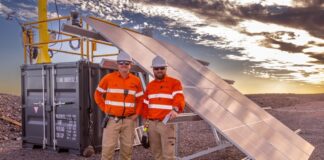All images FMG.
BY ELIZABETH FABRI
NEV Power is preparing to step down after six and a half eventful years at the FMG helm – leaving some mighty boots to fill. The seasoned executive reflects on his time at FMG and the company’s next chapter, as it embarks on the $US1.5 billion Eliwana project and examines diversification beyond iron ore.
Rewind the clock four or five years and it’s hard to believe FMG is the same company that stands here today.
In 2012/13, the iron ore miner was staring death in the face, drowning in a $US13 billion pool of debt just as the iron ore price was continuing its slow decline to late-2015 lows of $US38/t.
Many outsiders feared the worst, but even during the company’s darkest hour FMG chief executive Nev Power remained assured of a recovery.
“It’s been an absolute privilege and an honour to [serve] FMG for the whole time,” Mr Power told The Australian Mining Review.
“We’ve had some challenges, but I think the most rewarding and the most defining moments have been seeing how well the Fortescue team rallied behind the challenges that we have had.
“Though there was no shortage of times when we knew we would need to dig deep to make sure that we achieved what we wanted to, I was always confident that we would be able to meet those challenges.
“While it wasn’t always obvious publically, in many cases – certainly around the balance sheet and debt restructure – we always had a number of options.”
Mr Power joined FMG in February 2011 as chief operating officer before being promoted to chief executive as Andrew Forrest’s successor in July the same year.
His robust and collaborative leadership style, some quality decision making, and a dash of luck (brought on by the iron ore price recovery in 2016), were the key catalysts that helped navigate the company out of the danger zone and towards prosperity.
Today, FMG is the world’s fourth largest iron ore producer (and proud holder of a number of prestigious industry accolades) after quadrupling annual production to 170 million tonnes (mt), and reducing costs by more than two-thirds to become the lowest cost seaborne supplier of iron ore into China.
FMG has also been in a position to make early repayments to significantly reduce the amount of interest incurred on its debt.
Many hard decisions were made over his tenure; Mr Power said what was ultimately put in place “was the best of those options”.
“We made decisions in a very collaborative way,” he said.
“The whole organisation [was] involved in deciding what we needed to do to; everything from our marketing strategy right through to our finance strategy.
“All of those have been very successfully implemented.
“Some of the key [decisions] has been the focus on productivity and efficiency across the business to reduce our C1 costs, and to achieve the cost result where we are now the lowest cost iron ore producer in the world.
“I think that has been an outstanding result.”

Naming a successor
In September chairman Andrew Forrest announced Mr Power would step down from the role in February next year for some “well deserved” time off.
“Nev has executed his duties to the highest degree and met or exceeded the often unreasonable standards set by his Board,” Mr Forrest said.
“We could not be more pleased with his stewardship and respect his decision that it is time for the next chapter of Fortescue to begin.
“This is consistent with our long term succession plan and we both share great confidence in the quality of internal and external candidates to continue Fortescue’s legacy.”
The industry echoed Mr Forrest’s views, presenting Mr Power the 2017 Mines and Money Legend in Mining award at the International Mining and Resources Conference (IMARC) in November.
It is clear that Mr Power’s replacement will have some big shoes to fill.
While the verdict is still out on the board’s decision, all eyes are on FMG’s newly appointed director operations Greg Lilleyman as the presumed successor.
Mr Lilleyman joined FMG in January after spending 25 years at Rio Tinto, most recently as head of innovation and technology.
Speaking on the sidelines of the Committee for Economic Development of Australia (CEDA) WA Annual Resources Overview lunch in Perth late October, Mr Lilleyman said this was ultimately a decision for the board.
“For me in the meantime, I’ve got a fantastic job run at the operations and plenty of challenges to keep me busy so I’m focused on that,” Mr Lilleyman said.
Another possible internal option floating around is FMG’s chief financial officer Elizabeth Gaines, who joined the FMG executive team in February, after serving on the board since 2013.
Mr Power said the board would make an announcement “as soon as they are able”.
Media speculation is that a decision will be made before the Christmas period to allow for sufficient handover time before Mr Power’s last day on 16 February 2018.

Media speculation pegs Greg Lilleyman as Mr Power’s presumed successor.
The next phase
At the company’s Annual General Meeting (AGM) on 8 November, FMG announced it had chosen its $US1.5 billion Eliwana project, 90km from Tom Price, as the immediate replacement for its depleting Firetail mine.
The FMG board was faced with two options; extending the rail line from its Solomon Hub project 130km west to the Eliwana deposit, or develop a new operation at Nyidinghu about 40km south of its Chichester Hub to the east.
Mr Power said the 30mtpa Eliwana project offered more product options, better capital and operating costs and quicker timeline to market.
“There’s 2.1 billion tonnes of resource already identified there [Eliwana], it’s highly prospective and has great grades,” Mr Power said at the AGM.
“Of course, Nyiduingu remains a very significant ore body for future development and this just means that, in timing, the Eliwana Western Hub project will come before Nyidinghu.”
Approval processes, including mine and rail infrastructure for the Eliwana project have now begun, and timing on the commencement of operations will be made at the completion of a feasibility study, expected late FY18.
Over the course of the year, feasibility studies and development options for the Iron Bridge Magnetite project will also continue to be evaluated, with a decision expected to be made with FMG’s joint venture partners soon.
FMG will also be adding more autonomous trucks to its fleet in FY18 as part of its strategy to improve productivity.
The innovation push included converting up to 12 793F trucks to autonomous haulage technology (AHS) at Solomon Hub, the rollout of AHS across the Chichester Hub project, a relocatable overland conveyor trial at Cloudbreak mine, and IT network upgrades at Cloudbreak and Christmas Creek.
Diversification
Beyond its iron ore developments, FMG was also dipping its toes in a number of early-stage exploration options in the hunt for other commodities such as gold, lithium and copper.
Mr Power said the company was not specifically chasing one commodity over another, but rather interested in seeing how they could apply the skills and capabilities developed in its iron ore business to new areas.
“Our diversification strategy is driven by value creation so we’re not diversification for the sake of diversification or growth, but rather on where we can create value,” Mr Power said.
“We have been opportunistic in securing respective tenements in different commodities; some in the Pilbara, some outside the Pilbara, and we’re doing grassroots exploration or early stage farm-ins to see what we can find on those properties.”
The tenements included early stage exploration areas in the Pilbara, South Australia and NSW, and highly prospective areas of Ecuador where FMG holds 32 exploration tenements.
There was recent speculation the miner was looking increase its footprint in the Fraser Range, WA.
Mr Lilleyman said the company was “starting to take small bets” into exploration to see what opportunities were out there.
“I wouldn’t be sitting here saying we are pushing very hard in those areas, we’re certainly starting to make small investments to start to create some small opportunities,” he said.
“I think naturally for us, in the iron ore sector demand has been growing so strongly on the back of China’s development that there’s naturally a bit of plateauing in iron ore demand.
“If we want to grow our company, the options within iron ore are quite limited other than holding our own or improving our own performance to generate more value.
“Looking outside of iron ore is obviously the sensible step for us.”

Market outlook
Mr Power said one of the biggest issues facing its iron ore shipments at present was Beijing’s winter curtailment policy.
“It is already having very significant impact,” Mr Power said.
“I think its caught all the market by surprise as to how quickly those restrictions were put in place and it makes it a little bit hard to predict going forward, but at this stage there are a number of things happening.
“There’s a lot of steel production that will be increased outside of that area to compensate and steel mills within that area are doing a lot of work to reduce their emissions, so in the future they won’t need to restrict production to reduce airborne emissions overall.”
As a result of the policy, the Chinese steel industry was paying premiums for higher quality ore as part of government measures to reduce emissions; which has had an impact on FMG’s earnings for its lower grade ore.
FMG said it has had to lower its iron ore price realisation guidance to between 70 and 75 per cent of the benchmark high-grade iron ore index due to wide price discounts between high-grade and low-grade ore.
“The question remains going forward is to how deep those production restrictions are going to bite,” Mr Power said.
“This could be largely dependent on weather conditions as well, so it’s very hard to predict so it’s a matter of waiting and seeing.
“Having said that, the important thing from our perspective is focussing on the things that we can control.
“Our business is generating very strong cash returns, even where this market is today, so there is a lot of upside potential for us once these restrictions are lifted.”
As the wide price discounts continue, FMG said it was looking to expand into new markets in Europe and Asia to generate value, for example the UK, Germany, Southeast Asia and India.
“Investing in the long-term sustainability of our core iron ore business, maintaining production, further strengthening the balance sheet and generating shareholder returns remain our key priorities,” Mr Power said.



